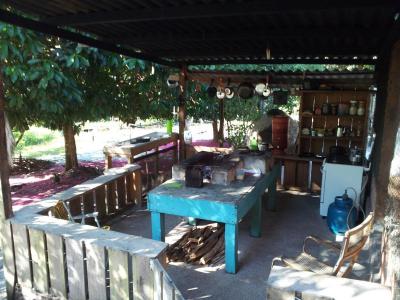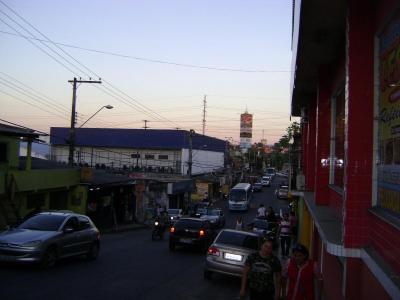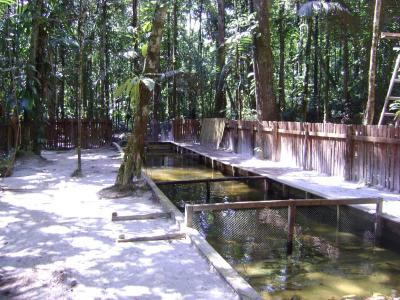The wrinkled Brazilian landscape passes below me, brownish green through the haze. Every so often the disordered mountain ridges grow crisp and straight, in parallel, like ribs.
Then the land flattens, consumed by endless trees to the horizon. As jungle overtakes the soil, no variety strikes the eye except for rivers: one, two, three, four, five veins of muddy brown lifeblood, traversing the sleeping green chest of the Amazon.
Beside me sits my traveling companion, my mother, who was born and raised in Brazil. For the first time in many years we’ve managed to match our schedules to travel here together from the U.S. She’s eager to show me parts of Brazil I’ve never known.
Above this seemingly interminable forest, who would believe the rate of Brazil’s growth – skyscrapers sprouting, small villages exploding into cities, cars crowding the highways – into the 6th largest economy of the world?
There, at the sink, stands my uncle, Jorge Daniel Fim. He slides thick chunks of meat onto a long double-barreled spit. He’s shirtless, in a pair of long army-green shorts. Beyond, the family ducks wait in the yard, dabbling at the sink outlet for coffee grounds or fish scraps.

My mother and I are sitting in one of the big open huts of Jorge’s sítio, or small farm property, in the jungle, about 100 kilometers west of Jorge’s house in the city of Manaus. A raised grill built from wood and concrete blazes. The pan for our caldeirada bubbles atop, cradled by flames.
Jorge’s wife, Luziene, chops vegetables for the stew, her wide, brown-skinned face bespeaking her native Brazilian background. Originally from a fishing family, she grew up among 12 brothers and sisters in a floating house on the Rio Negro, well inland of Manaus. Now she studies obstetrics at the Manaus hospital.
Today, before we left the city, she said, half-joking, that she’d almost brought a baby home. The child had been abandoned by its mother at 7 days old (the first time the hospital has faced such a dilemma in her time there) The hospital, said Lu, will seek adoptive parents for the child, but if the effort fails, some doctor or nurse who has become fond of the bichinho – an endearment meaning “little critter” – may well take it home. Though the hospital has searched for the mother, she may have given a false name, or come from Brazil’s interior – the mata, or Amazon forest – and how, Lu asked, would they ever find her in the middle of that?
An hour later, we squeezed into Jorge’s pickup truck to drive to his sítio, this set of huts and awnings amid the Amazon where he spends leisure time and conducts pisciculture research. We bumped and clattered along the dirt road leading into the jungle, Jorge navigating gullies and potholes carved by the rains, then baked by the hot sun.
“This is primary forest,” announced Jorge after an hour and a half, once we passed several communities of littlesítios. Many of them were marked with religious names – Sítio Bom Jesus, for example – by resident missionaries. “It’s never been cut.”
To either side, greenery of impenetrable density confronted us. Every foot of growing space, horizontally and vertically, was taken up by plants of astonishing variety. “These are plants that, back home, you grow in pots, with such care,” said my mother, pointing to a strapping, bushy froth of vegetation. “Here, look at it!”
Even here, in Jorge’s sítio, the municipal electrical network now reaches. There are lights, a refrigerator, a stereo, even a television for the two children, who dangle in their hammocks from the wooden ceiling of the main cabin, talking, arguing, and watching cartoons. As we wait for the meat and the steaming caldeirada, the two boys, Gabriel and Yuri, escape the television and now dart about underfoot, hungry, fighting one another.
We’ve arrived north after two weeks of visiting other relatives. My mother, who grew up with Jorge on the southern pampas of Brazil, hasn’t seen her younger brother in ten years. Some centrifugal force of the modern world scattered her six siblings across Brazil to Porto Alegre, Florianopolis, Boa Vista, Manaus, cities hours apart even by plane, limiting the visits possible to each. And I, born abroad, am almost as alien to this Amazon soil as the two Tennessee missionaries we met at a mercantile en route to the jungle. Though I’ve met Jorge during trips south, neither my mother nor I has previously visited his Amazonian home.
In Manaus two days ago, Jorge took us to his house on the outskirts of one of the poorer parts of the city. I leaned to the window, trying to take pictures of the ramshackle buildings and the loungers; of the people gathered around sidewalk tables, drinking or playing cards; of the children playing by the curb; of the stray dogs nosing around heaps of trash or loitering alongside the people, waiting for attention or scraps.

The city has mushroomed around Jorge in the 20 years he has lived there. Since 1990, its population has almost doubled to 2 million people. “All of this was forest,” he griped, as he drove us to his house. “Forest, forest, forest. All of this –” he waved his arm at the buildings, the supermarkets, the hasty and messy construction – “happened within the last ten years.”
Jorge’s house sits on a tidier street than most of the neighborhood. Even so, he pointed to a thin trickle of greenish liquid running by the curb. “It’s household drainage,” he said with disgust. “It would be so easy to get it disposed of properly. Nobody wants to though, nobody cares. And who am I to go against everybody else?”
Several times during our stay in Manaus, we arrived to find the parking spot in front of his gate blocked by another car. “You know why?” said Jorge, with a little grimacing smile, “It’s because I left a tree in front of my house. And everyone wants to park in the shade.” We waited while the neighbor hurried out and moved his car, cramming it under some smaller patch of foliage. “This neighbor used to have a beautiful tree in front of his house,” said Jorge, pointing. “But he cut it down. You know why? Because the leaves made a mess, and he didn’t want to be bothered.”
Manaus isn’t the only burgeoning growth my mother and I have seen this trip. During a drive up the southern coast a week ago, we searched for the small, quaint towns my mother remembered from her youth. But each was choked by development. Brazil’s growing middle class now seeks new infrastructure, living spaces, and vacation destinations. “I don’t even want to go into Camboriú,” my mother said, as we passed high rises on the outskirts of that coastal city. “I want to remember it like it was. In my time, it was a tiny fishing village. It had a few houses, some little bars. You would have loved it.”
Jorge is the family’s great nature and animal lover. He is famous for, at six years old, rescuing a chicken from my grandmother’s butcher knife. He’d snatched the bird, climbed to the roof, and stood at the edge of the tiles. “I’ll kill myself!” he shouted, clutching the chicken. “You’re not going to kill her! Promise you won’t kill her!” Alarmed, my grandmother promised not to, and she didn’t.
“The roof wasn’t really high enough for him to kill himself, but he would have broken a leg,” said my mother, laughing. “And he meant it! He would have jumped.”
Now he researches fish for Brazil’s National Institute of Amazon Research (INPA), studying native, traditional alimentary species. He has developed a system that allows small-scale farmers living deep in the jungle away from larger rivers to farm fish in a more ecologically sound manner. Formerly, he says, the region’s fish cultivators constructed substantial dams and pools – damaging sizeable swaths of forest, altering the water’s chemistry, and limiting production because blooms of zooplankton, which thrive on still, muddy bottoms, consume the water’s oxygen. His system, instead, relies on a long, narrow wooden enclosure built into creek walls, with a running ingress and egress. The fish swim there as naturally as in a forest stream.

Originally, he designed the system for a small family to feed themselves, with enough extra fish to sell and make a small living. But, he said, it can be scaled up for economic production, even to the village level. The system, described in a 2009 INPA publication1, is being put into production throughout the Amazon.
Pirarucu, matrinxã, tambaqui. As I stood this afternoon by the creek at Jorge’s sítio, on the banks of one such system, my uncle pointed out each fish by its native Indian name. Ranging from a foot to the length of my torso, the supple creatures swam comfortably below me, scales glinting under the dappled light.
I’m lying on my small cot – a mattress, really – on the floorboards of the second floor of the main cabin. We’ll all sleep here tonight, some of us on mattresses, some in hammocks that hang silent and empty from the beams.
Around me hum the night’s myriad noises. A hammock creaks against the boards below as one of the boys swings. The voices of Jorge and my mother murmur as they catch up after too many years. The boys let out an occasional, high insistent plaint: “Senta aqui, você mal-educado!” older Gabriel calls to Yuri. And of course I hear the jungle: a deep vibration of insects. Some buzz; others chirrup or tweet like birds; some, like katydids, trill out successive demanding notes.
After dinner my mother and I walked with Jorge up the driveway. He carried a flashlight, explaining that snakes are common here. “Which kind?” asked my mother. “Venenosa,” Jorge replied. Boa constrictors, too, sometimes enter the sítio. Once, Jorge woke to find that a snake had spent the night under his pillow. “I was lucky,” he said, “because I’d had a bit to drink, so I didn’t move all night long. And she liked it, because it was warm under there!”
As human activity encroaches on the Amazon, Jorge frets. He pointed out in the flashlight’s circle the sand of the road, crevassed by the rains’ erosive force. “Most of the Amazon is made of this,” he told us, “a foot of organic loam, then sand. Without trees, the rain just washes it away. The moment you cut down the trees –” then he said something untranslatable: “Já era!”
In literal terms, his phrase means “It has been;” but, more aptly and poignantly, it also suggests “and it’s gone forever.” The words ring of long ago, of the deep past, of a more innocent time that can never return. And to me, they ring for my mother’s Brazil – one I cannot reach or know.
As we walked, two birds called back and forth a warbling note, whippoorwill-like. The sky lay black as velvet, of great softness and deepness, with the stars burned into it. Largish bats emerged from the avenue of the driveway, rounded the corner, and vanished on down the road, twenty feet above us, silent and ephemeral, lit by the moon.
Naila Moreira is a lecturer and writing counselor at Smith College in Northampton, Massachusetts.
Photo credits: Naila Moreira
1 Fim, Jorge Daniel Indrusiak, Guimarães, Sérgio Fonseca, Storti Filho, Atílio, Bobote, Avemar Gonçalves, & da Rocha Nobre Filho, Gabriel (2009). Manual de Criação de Matrinxã (Brycon amazonicus) em Canais de Igarapes. Manaus, Brazil: Editora do Instituto Nacional de Pesquisas da Amazônia.



